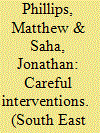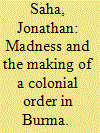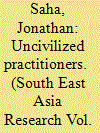|
|
|
Sort Order |
|
|
|
Items / Page
|
|
|
|
|
|
|
| Srl | Item |
| 1 |
ID:
126638


|
|
|
|
|
| Publication |
2013.
|
| Summary/Abstract |
When Ian Brown first visited Thailand in the 1970s, it was a deeply fragmented place. The Vietnam War was raging and US Army personnel dominated downtown Bangkok. In the country's universities, leftists of varying degrees of radicalization fought ideological battles against a conservative military and business elite. Extrajudicial violence was commonplace, and intrigue about the true extent of Communist subversion in the country reigned. It was the height of the Cold War, and there was a palpable sense that ideological forces should be used to determine both the country's future and a correct interpretation of the past.1 So it is notable that Ian's early work not only managed to remain aloof from the political cauldron in which it was written, but that it was so clearly opposed to the historical determinism that was such a prevalent feature of the time
|
|
|
|
|
|
|
|
|
|
|
|
|
|
|
|
| 2 |
ID:
126653


|
|
|
|
|
| Publication |
2013.
|
| Summary/Abstract |
As Professor Ian Brown's recent work on the colonial prison in British Burma has shown, the proportion of the population convicted of crimes was routinely and markedly higher than in any other province of British India. Part of the explanation for the exceptionally high figures may be the colonial criminalization of practices that were previously lawful. Gambling was one such activity that the British, at least according to their rhetoric, were intent on prohibiting as part of their 'civilizing mission'. However, in practice colonial law was more ambiguous and equivocal. Government prosecutors and judges disputed the definition of gambling and struggled to differentiate it from other tolerated practices. Beyond these legal difficulties, individual British officials often found it necessary to turn a blind eye to gambling. On an everyday level, subordinate officials in the police and magistracy had an ambivalent relationship with gambling. Although empowered to suppress it, some chose to ignore its presence and others still were actively conniving with it. By studying how the British sought to control gambling in the colony at the turn of the twentieth century, this article seeks to restore the full complexity to the history of criminality in colonial Burma.
|
|
|
|
|
|
|
|
|
|
|
|
|
|
|
|
| 3 |
ID:
118921


|
|
|
|
|
| Publication |
2013.
|
| Summary/Abstract |
In general, during the nineteenth century the British were indifferent to the condition of the insane in colonial Burma. This was most apparent in the Rangoon lunatic asylum, which was a neglected institution reformed reluctantly and episodically following internal crises of discipline and the occasional public scandal. However, whilst psychiatry was generally neglected, British officials did intervene when and where insanity threatened the colonial order. This occurred in the criminal courts where the presence of suspected lunatics was disruptive to the administration of justice. Insanity was also a problem for the colonial regime within the European community, where erratic behaviour was viewed as a threat to racial prestige. This paper shows how, despite its neglected status in Burma, psychiatric knowledge contributed to British understandings of Burman masculinity and to the maintenance of colonial norms of European behaviour.
|
|
|
|
|
|
|
|
|
|
|
|
|
|
|
|
| 4 |
ID:
117065


|
|
|
|
|
| Publication |
2012.
|
| Summary/Abstract |
Indian and Burmese medical subordinates were problematic figures for British colonial officials in Burma during the nineteenth century. They were intrinsic to their plans for furthering colonial medicine in the colony, at the expense of indigenous practices. Yet, at the same time, they were never under the complete control of British officials, often being accused of negligence, misconduct and outright corruption. In short, they were seen as a necessary evil. This article explores the role played by medical subordinates in colonial Burma, as well as the ambivalent British attitude towards them, by tracing the history of attempts to train them and by examining episodes of their misconduct, which was especially prominent in the production of medicolegal evidence. Focusing on these medical subordinates highlights the need for a historiographic rethink of the relationship between medicine and the colonial state. Medicine was not a tool of the colonial state, but a set of practices through which the state was performed.
|
|
|
|
|
|
|
|
|
|
|
|
|
|
|
|
|
|
|
|
|